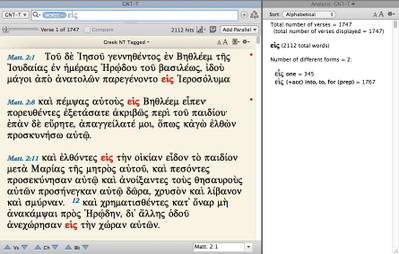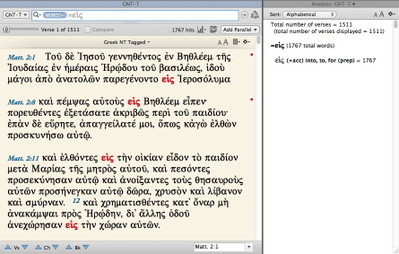In yesterday’s post, I wrote that if you know how to search for εἰς, you’re well on your way to being a searching “ace.” It was an admittedly nerdy pun, since the Greek word εἰς is pronounced like the English word “ace.” I’m feeling a little less nerdy today, however, since someone made the even nerdier observation that my pun only works for the artificial Erasmian pronunciation scheme as opposed to other systems!
Whether or not my joke works in your preferred system of Greek pronunciation, my point is that searching for εἰς offers a great opportunity to learn some important aspects of searching in the original languages. As I pointed out yesterday, a search for epsilon-iota-sigma actually finds both εἰς and εἷς, two words which are spelled the same but have a different breathing mark. Yet even when we included a smooth breathing mark to search specifically for εἰς, our search still gave us both εἰς and εἷς. That’s because Accordance actually ignores breathing marks, accents, vowel points, and even upper or lowercase for purposes of searching.
But what if you don’t want those things to be ignored? What if you really want to be able to find εἰς without also finding εἷς?
Here’s the secret: whenever you want Accordance to pay attention to breathing marks, accents, vowel points, and case, simply enter an equals sign (=) before the word you’re searching for, like this:
Notice that with the equals sign before εἰς, the number of hits drops from 2112 to 1767. Likewise, the Analysis shows that εἰς is the only lexical form that was found, and εἷς has been excluded.
So to become an ace at original language searching, remember the lesson of εἰς: use the equals sign to make Accordance pay attention to breathing marks, accents, vowel points, and case.
In my next post, we’ll try to search for εἷς, and I’ll give you a few more ace searching tips.



